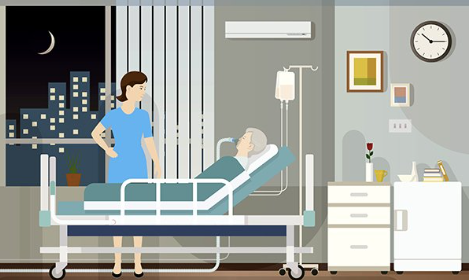
Tips for Navigating Night Shifts
Picture this: The world is asleep, but inside a hospital, a long-term care home, or a bustling emergency department, the night shift is in full swing. While city lights flicker outside, healthcare workers are making their rounds, monitoring patients, responding to emergencies and keeping the entire operation running smoothly. The night shift isn’t for the faint of heart, but for those who master it, it can be both rewarding and manageable.
Understanding the Night Shift Across Different Healthcare Facilities
Not all night shifts look the same. Where you work and what you do depends on your role and the type of healthcare facility you’re in.
Hospitals – In emergency departments, RNs and RPNs handle critical cases, responding to traumas, heart attacks and sudden deteriorations. In ICUs, nurses monitor patients on ventilators, adjust medications and ensure that the critically ill receive continuous care. On surgical floors, post-op patients need pain management, wound care and close observation.
Long-Term Care Homes – Here, personal support workers (PSWs) assist residents with mobility, hygiene and overnight care, while RPNs manage medications and monitor for changes in residents' conditions. RNs oversee care plans and respond to any medical emergencies that arise.
Rehabilitation Centers – Night shifts in rehab facilities involve monitoring patients recovering from strokes, surgeries, or injuries. Nurses ensure pain management is on track, assist with repositioning to prevent bedsores, and provide emotional support to patients struggling with sleep disruptions.
Home Healthcare – Some healthcare workers, like home care nurses and PSWs, provide overnight care for patients needing continuous monitoring. This can involve checking on ventilators, administering medications, or simply being a reassuring presence for those with complex medical conditions.
What Healthcare Workers Do on the Night Shift
The night shift isn’t just about staying awake—it’s about staying alert and ready for anything. Here’s what different healthcare professionals might be doing during those late hours:
Registered Nurses (RNs) – Conduct hourly patient assessments, administer IV medications, manage ventilators, and oversee the care provided by RPNs and PSWs.
Registered Practical Nurses (RPNs) – Provide bedside care, distribute medications, assist with wound care, and monitor for signs of patient deterioration.
Personal Support Workers (PSWs) – Help patients with repositioning, hygiene, and comfort care, especially in long-term care or home healthcare settings.
Respiratory Therapists – Monitor ventilated patients, adjust oxygen levels, and respond to respiratory emergencies in hospitals and long-term care facilities.
Phlebotomists – Draw early-morning blood samples for lab testing so results are ready by morning rounds.
Medical Laboratory Technologists – Analyze test results from overnight bloodwork and urgent lab requests.
Tips for Thriving on the Night Shift
Surviving—and thriving—on the night shift takes some strategy. Here are a few tips to make it easier:
Master Your Sleep Schedule – Try to maintain a consistent sleep routine, even on your days off. Blackout curtains and white noise machines can help create a restful environment.
Fuel Your Body Right – Avoid heavy meals that can make you sluggish but keep healthy snacks and protein-rich foods on hand to maintain energy levels.
Stay Hydrated (But Not Too Much!) – Water is essential, but pacing your intake prevents unnecessary bathroom breaks when you’re swamped with work.
Keep Moving – A quick walk, stretching, or even a few squats in a quiet hallway can help keep fatigue at bay.
Lean on Your Team – Night shifts are smoother when you have a solid team to rely on. Check in with colleagues, communicate effectively and don’t hesitate to ask for help when needed.
The Night Shift Life
While working overnight can be challenging, it’s also an opportunity to develop new skills, take on leadership roles and gain experience in high-pressure situations. Whether you're a nurse monitoring post-op patients, a PSW helping residents in a long-term care home, or a respiratory therapist adjusting ventilator settings, the night shift is essential to keeping healthcare facilities running 24/7.
And when the sun finally rises? There’s nothing quite like stepping outside, knowing you’ve helped keep patients safe through the night. If you’re interested in exploring night shifts, download download the Staffy Health app today on the App Store or on Google Play to get started!
Related Blogs
Let's improve patient care together.
Choose the day, time, skill, and rate you want and get matched with qualified talent immediately.




